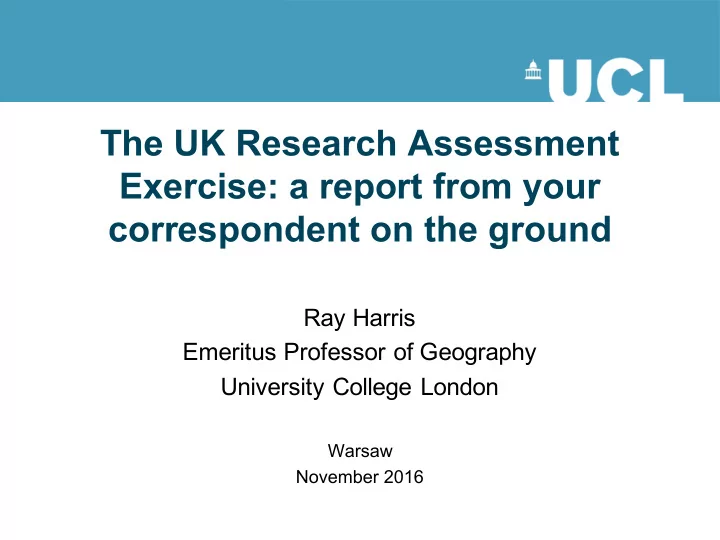

The UK Research Assessment Exercise: a report from your correspondent on the ground Ray Harris Emeritus Professor of Geography University College London Warsaw November 2016
Agenda • Ray Harris • Lecturer University of Durham 1976 – 1987 • Professor University College London 1995 – present • Overview of the RAE • Main features of each round • Behaviour changes • Conclusions • The 2008 RAE cost £47 million [ca. 60 million euros] to review only English universities
Key dates • 1986 Research Selectivity Exercise • 1989 Research Selectivity Exercise • 1992 Research Assessment Exercise • 1996 Research Assessment Exercise • 2001 Research Assessment Exercise • 2008 Research Assessment Exercise • 2014 Research Excellence Framework
Before 1986 • Research funding based on previous funding allocations • Quinquennial Review (5 years) • Old boys network • Research done after teaching was over • Sir Peter Swinnerton-Dyer • VC Cambridge • Head University Grants Committee
1986 Research Selectivity Exercise • 37 cost centres = groups of subjects • Each university submitted five outputs to each relevant cost centre and up to four pages of general description of research strength • Results on a 4 point scale : outstanding to below average • “We have to worry when they really Professor Peter Haggett allocate money to the results”
1989 Research Selectivity Exercise • 152 subject units • 70 peer review panels • Results on a five point scale : national and international levels of attainment • Academics now becoming accustomed to reviews and terminology
1992 Research Assessment Exercise • “Research active” staff submitted • 72 units of assessment, 63 review panels • Results reported in five grades 1,2,3,4,5 • No money for grades 1 and 2
1996 Research Assessment Exercise • 69 units of assessment • 60 panels • Research work over 4 years except for humanities which was over 6 years • Results reported in seven grades (1,2,3b, 3a,4,5,5*) • No money for grades 1 and 2
2001 Research Assessment Exercise • 69 units of assessment • 5 umbrella groups of panel chairs to try and achieve greater consistency • Results reported in seven grades (1,2,3b, 3a,4,5,5*) • Departments rated in the top two categories contained nearly 40 per cent of academics compared with only 13 per cent in 1992 • No money for grades 1, 2 and 3; less money for grade 4
2003 Roberts Review • Extensive consultation • Academics : we do not like it but keep the RAE • Expert review essential • Research profiles for departments not single grades • Comparability across Sir Gareth Roberts disciplines
2006 Metrics Proposal • Chancellor of the Exchequer Gordon Brown announced RAE peer review to be replaced by metrics – research income, citations, postgraduate numbers, etc • Dropped after pressure from academics
2008 Research Assessment Exercise • 67 panels overseen by 15 umbrella panels • Explicit criteria • Grades as 2001, ie 1,2,3b,3a,4,5,5* • Only money for 5 and 5* • Cost of the 2008 RAE was £47 million
2014 Research Excellence Framework • 36 panels and 4 umbrella panels • Outputs : 65% • Impact : 20% • Environment : 15% • Some metrics, eg citations • Only money for grades 3 and 4 (ratio 1:4)
Behaviour changes • Focus on research • Comparative neglect of teaching • Selective research output (best four items) becomes a target for total output • Staff poaching • Gaming • Active management by universities – staff, departments, faculties
Conclusions • Expensive • Approximately 1000 euros per academic staff member per assessment • Academics want to keep the RAE/REF because metrics are worse. Metrics are cheap but do not capture subtlety. • Transparent; stated criteria; but • Always changing • Increasingly political because UK governments want to interfere : as student numbers increase so does political interference in universities
Recommend
More recommend